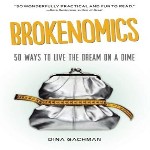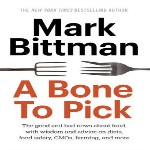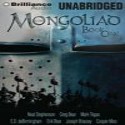JUNE 2015
AUDIO BOOK REVIEWS
by Jonathan Lowe
|
A
report on the Audie Awards: I was a judge in the multi-voice
category, which was won by Neil Gaiman’s THE
GRAVEYARD BOOK, which was not actually my own
first pick, although an excellent production. A special
honor was paid to actor Edward Herrmann, who died this
past year, (leaving many in tears,) and won for Best
Biography with THE BULLY PULPIT. Best
Humor audiobook went to Amy Poehler’s
YES PLEASE. Fiction winner (and also Pulitzer
Prize winner) was ALL THE LIGHT WE CANNOT SEE.
Best Mystery was THE SILKWORM. And
Audiobook of the Year went to MANDELA: AN AUDIO
HISTORY. The awards ceremony was in conjunction
with Book Expo America in NY.
|
|
 |
BROKENOMICS
by Dina Gachman is subtitled “50 Ways
to Live the Dream on a Dime.” While it might seem
like just another how-to on surviving the economy, it’s
also a humorous memoir told in the advice of “lessons
learned” style, and covers fashion, dating, shopping,
budgeting, cooking, and about three dozen other items
on the list of anyone who doesn’t own a basketball
team and sits in the Shark Tank viewed by drooling masses
of wannabes. The “dream” in question is
yours (or should be), although Dina plays along with
the games we all do in imagining a life (or love) fitting
the pop model. She reads the text herself,
and so listeners get the bonus of feeling that edge
of authenticity to the reading (which is always good
for memoirs; the science book below is also an offbeat
memoir, and so the same effect is realized.) What’s
great about books like these is that you get honest
revelations, together with good advice. It’s not
some lucky billionaire or diva who has 7 million followers
on Instagram (all Selfies), writing an advice book about
how to be just like him or her. (Right.) Not all of
us win the lottery, genetic or Powerball. But we can
be smart and funny, if we put in the effort. This audiobook
is for us.
|
|
 |
A
BONE TO PICK by Mark Bittman is a collection
of essays on food and the diet by the iconic NY Times
writer and author of “How to Cook Everything.”
What is amazing, even today, is the ignorance people have
on the subject of food processing and ingredients, given
all the money poured into advertising that uses images
and enticements, targeting consumers by their demographics.
Food is big business, and with so much money at stake
producers will say and do just about anything, and when
they are caught (like a recent deli chain was) they talk
about “transparency” as they take away many
of the artificial, shadowy inGREEDients, additives and
fillers they used for years and years (unknown to consumers),
expecting your good will and respect now (even as they
claim the additives were not really bad at all.) Synthetic
wood resin is not something you would choose to eat when
you buy a deli sandwich. But if it helps their bottom
line, they are willing to use it to extend shelf life,
to protect taste (which is all consumers seemed to care
about in the past)…so long as customers are kept
in the dark and come in like lemmings after being entranced
and Brandwashed on TV. The processed food aisles in grocery
stores also benefit by data and studies tweaked by “scientists”
on retainer by these companies. The major media don’t
want to rattle the cage of these company Kongs, either,
since much of their NY advertising dollars are derived
by questionable food sales. Pittman bites back, as did
the author of Salt Sugar Fat, read by Scott Brick
(who won an award for that audiobook.) Robert Fass is
an always engaging narrator who reads Bittman’s
coverage of food safety, GMOs, farming, and relates that
there is hope as improved education changes the system…as
is already starting to happen. |
|
Welcome
to Spacebook. In the future, according to Neal Stephenson
in SEVENEVES, that will be where everyone
goes for sharing. Why? Because the moon has blown up,
and mankind is facing extinction unless we can get into
orbit and figure a way to clean up the falling bolides
(rocks)…an impossibility, and so various descendants
of evolved humans must try to reestablish a sustainable
civilization out of the rubble while the diminished population
lives in space. This is a massive book to read, which
would be no problem were it really, really good. It is
not. At least not as a novel that inspires readers with
poetic imagery and tightly controlled action. There are
impressive ideas floated here, and much argument on how
technology can solve the problems humanity faces. So science
geeks will appreciate the depth of the story. But this
should have been, somehow, a non-fiction book. There are
simply too many characters and too slow a pace
 |
for
it to work as an epic-sized novel. Other books by Stephenson
have obviously succeeded brilliantly. Snow Crash
was one of my favorites. This book is no Snow Crash.
Since Neal is adept at research and ideas related to history,
not to mention skill at creating characters which many
lesser writers are not, let me recommend instead MONGOLIAD,
a relatively recent collection with various authors like
Greg Bear assisting. Reader Mary Robinette Kowal can’t
be faulted for bringing a believable interpretation to
both male and female voices, it’s just that much
of the book is exposition rather than dialogue or action.
Many authors deliver overwrought books to their editors,
it just seems that Neal’s editor was out of the
country on extended holiday. Emphasis on the word “seems."
|
|
|
One
can hear why Stephen King loved THE DEAD LANDS.
Benjamin Percy has a command of language, avoids
cliches, and brings to bear a unique apocalyptic vision,
turning the book into a kind of Lewis & Clark expedition
to restore sanity to a blasted landscape of alternate
reality. In some ways it reminded me of Station
Eleven by Emily Mandel, for its new twist and
commentary of what we are doing to ourselves (and can’t
seem to stop.) There are no zombies involved, which is
nice too. And different. Giant spiders, though, and magic
(and/or technology that seems like magic.) Like King,
Percy first establishes and then involves the
characters
in ways that are true to them, riddled as they are with
flaws and quirks.
Holter
Graham as narrator disappears behind the words,
told with an attention to pacing and tone. If you just
have to have zombies and a predictable ending that follows
the formula of most Hollywood scripts, you’ll be
disappointed. But if “different” is a plus
in your column of desires, and you have the patience for
an evolving story, this may be your cup of scary, guilty,
but delicious turtle soup. |
|
| |
|